

MEKTOUB : C'est écrit ! INTRODUCTION. En France environ 20% des élèves qui entrent en sixième ne maîtrisent que très partiellement l'écrit, 10% sortent sans aucune qualification du système éducatif, 50% seulement avec un titre de niveau V ( c.a.p).
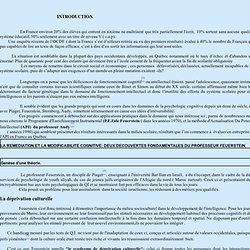
Une enquête récente de l’OCDE ( dont la France s’est d’ailleurs retirée au vu des premiers résultats) évalue à 40% le nombre de Français qui ne sont pas capables de lire un texte de façon efficace, c’est à dire d’en sortir les informations qui leur sont utiles. La situation est semblable dans la plupart des pays occidentaux développés, au Québec notamment où le taux d’échec et d'abandon scolaire est énorme: Plus de quarante pour cent des enfants qui devraient être à l’école cessent de la fréquenter avant la fin de scolarité obligatoire Les moyens de remettre dans le circuit social et économique , ces personnes défavorisées, déclassées, actuellement incapables de profiter du système scolaire, puis de s’adapter aux exigences d’un monde en pleine mutation existent -ils?
Action learning. Revision control. Revision control, also known as version control and source control (and an aspect of software configuration management), is the management of changes to documents, computer programs, large web sites, and other collections of information.
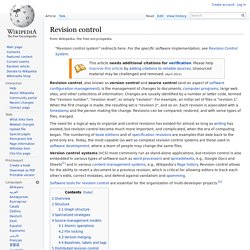
Changes are usually identified by a number or letter code, termed the "revision number", "revision level", or simply "revision". For example, an initial set of files is "revision 1". When the first change is made, the resulting set is "revision 2", and so on. Each revision is associated with a timestamp and the person making the change. Revisions can be compared, restored, and with some types of files, merged. Edward de Bono. Edward de Bono (born 19 May 1933) is a Maltese physician, author, inventor and consultant.
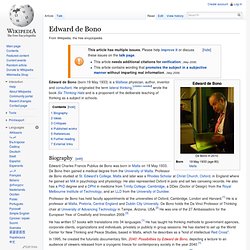
He originated the term lateral thinking,[citation needed] wrote the book Six Thinking Hats and is a proponent of the deliberate teaching of thinking as a subject in schools. Biography[edit] Professor de Bono has held faculty appointments at the universities of Oxford, Cambridge, London and Harvard.[1] He is a professor at Malta, Pretoria, Central England and Dublin City University. Antipositivism. Intelligence fluide et intelligence cristalisée.
Actualisation du potentiel intellectuel. Un article de Wikipédia, l'encyclopédie libre.
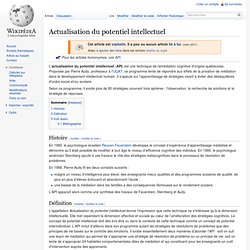
Pour les articles homonymes, voir API. L'actualisation du potentiel intellectuel (API) est une technique de remédiation cognitive d'origine québécoise. Proposée par Pierre Audy, professeur à l'UQAT, ce programme tente de répondre aux effets de la privation de médiation dans le développement intellectuel humain. Il s'appuie sur l'apprentissage de stratégies visant à éviter des déséquilibres d'ordre social et/ou scolaire. Selon ce programme, il existe plus de 80 stratégies couvrant trois sphères : l'observation, la recherche de solutions et la stratégie de réponses. Histoire[modifier | modifier le code] En 1980, le psychologue israélien Reuven Feuerstein développe le concept d’expérience d’apprentissage médiatisé et démontre qu’il était possible de modifier à tout âge le niveau d’efficience cognitive des individus. En 1988, Pierre Audy fit les deux constats suivants :
Metacognitive Realism Cognitive Style Or Learning Strategy. Métacognition et réussite des élèves. Ce nouveau site, offrant un meilleur confort de lecture, a pu voir le jour grâce aux généreux dons de nos lecteurs durant notre campagne de financement participatif.
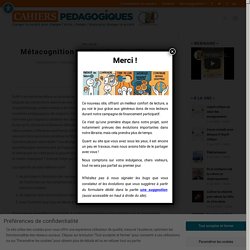
Ce n’est qu’une première étape dans notre projet, sont notamment prévues des évolutions importantes dans notre librairie, mais cela prendra plus de temps. Quant au site que vous avez sous les yeux, il est encore un peu en travaux, mais nous avions hâte de le partager avec vous ! Nous comptons sur votre indulgence, chers visiteurs, tout ne sera pas parfait au premier jour. DISPOSITIVOS BASICOS DE APRENDIZAJE. Bernadette Charlier. My Personal Knowledge Management. Personal Knowledge Management : How2 : Le Blog de la Productivité Personnelle. Par PKM, on entend Personal Knowledge Management qui peut être traduit en français par la « gestion des connaissances personnelles ».
Knowledge Management Software - lexiCan. Le Personal Knowledge Management, ou comment mieux gérer vos informations personnelles. Personal knowledge management. Mental management. Mental Management explores, describes and studies the mental processes in their diversity.
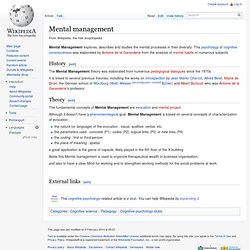
This psychology of cognitive consciousness was elaborated by Antoine de la Garanderie from the analysis of mental habits of numerous subjects. History[edit] The Mental Management theory was elaborated from numerous pedagogical dialogues since the 1970s. It is linked to several previous theories, including the works on introspection by Jean Martin Charcot, Alfred Binet, Maine de Biran, the German school of Würzburg (Watt, Messer,[disambiguation needed] Bühler) and Albert Burloud, who was Antoine de la Garanderie's professor.
Gestion mentale. Un article de Wikipédia, l'encyclopédie libre.
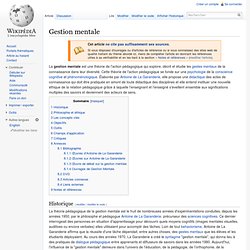
La gestion mentale est une théorie de l'action pédagogique qui explore, décrit et étudie les gestes mentaux de la connaissance dans leur diversité. Cette théorie de l'action pédagogique se fonde sur une psychologie de la conscience cognitive et phénoménologique. Élaborée par Antoine de La Garanderie, elle propose une didactique des actes de connaissance qui doit être pratiquée en amont de toute didactique des disciplines et elle entend instituer une nouvelle éthique de la relation pédagogique grâce à laquelle l'enseignant et l'enseigné s'éveillent ensemble aux significations multiples des savoirs et deviennent des acteurs de sens.
Historique[modifier | modifier le code] La théorie pédagogique de la gestion mentale est le fruit de nombreuses années d'expérimentations conduites, depuis les années 1950, par le philosophe et pédagogue Antoine de La Garanderie, précurseur des sciences cognitives. Philosophie et éthique[modifier | modifier le code] Mind Mapping Software, Brainstorming, GTD and Knowledgebase Software.
10 Tips for Teachers Using Evernote – Education Series. Posted by Michael Cruz on 13 Jan 2011 Comment Michael Cruz is a great example of someone that has fully embraced the benefits of putting technology to use in a classroom setting.

For five years, he taught courses at San Jose State University’s College of Business ranging from web marketing to entrepreneurship. He now focuses on technology and productivity. Evernote is a great application for educators. As a teacher, my Evernote use falls into three categories: Prior to classDuring classAfter class Prior to class Plan and organize your classes with tags: Using tags is a great way to organize your classes on a week-to-week basis or on a class-by-class basis.
During Class Share a notebook with your class: After you create a public notebook, share the URL with your class. Visual bookmarking. Accompagner le travail des adolescents : Avec la pédagogie des gestes mentaux: Amazon.fr: Guy Sonnois. Journal of Physiology-Paris : The slow process: A hypothetical cognitive adaptation for distributed cognitive networks.
Volume 101, Issues 4–6, July–November 2007, Pages 214–222 The Evolution of Human Cognition and Neuroscience: a Dialogue between Scientists and Humanists Edited By Alan Smith, Yves Frégnac and Kirsty Grant Abstract Human cognitive evolution is characterized by two special features that are truly novel in the primate line.
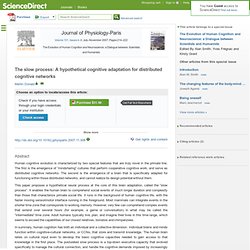
The Polka Dot Patch: Whole Brain Teaching Gestures, More Fun with Vinyl and TPT Sale!!! I have had a lot of requests for the gestures I use with my rules.
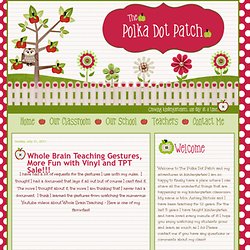
I thought I had a document that lays it all out but of course I can't find it. The more I thought about it, the more I am thinking that I never had a document. I think I learned the gestures from watching the numerous Youtube videos about Whole Brain Teaching - Here is one of my favorites!! You will notice that my rules are a little bit different than the ones that are in the video. After using them for a few years a fellow teammate and I decided to tweak them just a little bit for this school year and see how it works. Coming Soon!!! Successful Learning - Designing Learning Environments.
An efficient way to accomplish this challenging task is to determine common learning-difference profiles and match individualized solutions to audiences differentiated by these profiles. This is actually simpler than it seems. Research helps us broadly describe four learning orientation profiles. Below are descriptions for mass customized learning environments that fit each of the learning orientations: Transforming Learners prefer loosely structured, flexible mentoring environments that promote challenging goals, discovery, strategies, problem solving, and self-managed learning.
Performing Learners prefer semi-structured environments that stimulate personal value and provide details, tasks, processes, and creative interaction (hands-on) not exploration and great effort. What is an instructional program? Classroom behavior management system. Learning and the Environment. In Simulations and the Future of Learning: An Innovative (and Perhaps Revolutionary) Approach to e-Learning, Clark Aldrich writes that It is not the normal how-to textbook, but rather a true story about building a leadership simulation.
It is quite interesting and highly recommended. In the book, Aldrich discusses three types of contents: linear, cyclical, and open-ended. He recently refined and elaborated on this concept with a paper titled Six Criteria of an Educational Simulation. In the paper, Aldrich writes that there are six criteria, divided into two groups, that compose a learning environment: Content Types: Linear Cyclical System Delivery Elements: Pedagogy Game Simulation Content Types. Assistive technology. "Adaptive technology" redirects here. Hearing aid Assistive Technology is an umbrella term that includes assistive, adaptive, and rehabilitative devices for people with disabilities and also includes the process used in selecting, locating, and using them.
AT promotes greater independence by enabling people to perform tasks that they were formerly unable to accomplish, or had great difficulty accomplishing, by providing enhancements to, or changing methods of interacting with, the technology needed to accomplish such tasks. Assistive Technology and Adaptive Technology[edit] The term Adaptive Technology is often used as the synonym for Assistive Technology, however, they are different terms. Hand Gestures Dramatically Improve Learning.
Kids asked to physically gesture at math problems are nearly three times more likely than non-gesturers to remember what they've learned. In the journal Cognition, a University of Rochester scientist suggests it's possible to help children learn difficult concepts by providing gestures as an additional and potent avenue for taking in information. "We've known for a while that we use gestures to add information to a conversation even when we're not entirely clear how that information relates to what we're saying," says Susan Wagner Cook, lead author and postdoctoral fellow at the University.
"We asked if the reverse could be true; if actively employing gestures when learning helps retain new information. " It turned out to have a more dramatic effect than Cook expected. In her study, 90 percent of students who had learned algebraic concepts using gestures remembered them three weeks later. Cook used a variation on a classic gesturing experiment. Pédagogie de projet. Un article de Wikipédia, l'encyclopédie libre. La pédagogie de projet est une pratique de pédagogie active qui permet de générer des apprentissages à travers la réalisation d'une production concrète. Gestures and learning: Using gestures.
I was a member of my high school debate team, and I did fairly well, but my partner, Glenn, always got better marks from the judges. Most often, they praised his hand gestures, which were proclaimed to be “expressive” and “informative.” One year our topic was arms control, and our opponents were arguing that “NATO standardization” could help reduce U.S. arms sales. Didactique de la physique et pédagogie des gestes mentaux = Physics didactics and mental gesture pedagogy. Movement in learning. Movement in learning is a teaching method based on the concept that humans learn better through movement. This teaching method can be applied to students, who should have the opportunity throughout a class period to move around to take "brain breaks" to refocus their attention so they can learn new material.
Focus stacking. Blended learning. Blended learning is a formal education program in which a student learns at least in part through online delivery of content and instruction with some element of student control over time, place, path or pace.[1] While still attending a “brick-and-mortar” school structure, face-to-face classroom methods are combined with computer-mediated activities.[2] Proponents of blending learning cite the opportunity for data collection and customization of instruction and assessment as two major benefits of this approach.[3] Schools with blended learning models may also choose to reallocate resources to boost student achievement outcomes.[4] Terminology[edit] History of the term[edit] The concept of blended learning has been around for a long time, but its terminology was not firmly established until around the beginning of the 21st century. Word usage and context[edit] Blended Learning History[edit] Advantages/disadvantages[edit] Advantages[edit] Disadvantages[edit] Community[edit]
A Constructivist Model (Constructivist Instructional Framework), Learning object. Instructional design. Instructional technology. Educational technology. E-learning. Micromonde. Microlearning. Serious game. Neurodevelopmental framework for learning. Smalltalk. Imagine, program, share.
Pr raph.rtf. L'API - le blog plaisirapprendre.